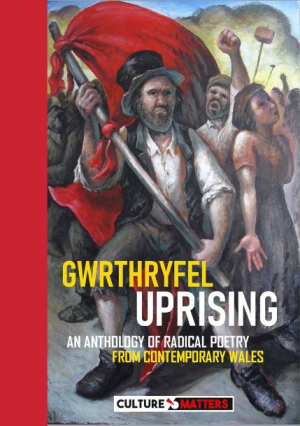
Culture for All: Why Sport Matters
As part of the Culture for All series, supported by the Communication Workers Union, we're proud to present a short film about why sport matters, by Michael Roberts.
Why Sport Matters
by Michael Roberts
Sport is one of the most popular cultural activities in the world. It is essential to our physical, emotional and mental health, and to developing our individual talents, abilities and social skills like friendly competition, co-operation, solidarity and collective, co-ordinated effort. The recent attempt to form a ‘super league’ of top European clubs was a serious threat to these underlying values, a classic example of the way capitalism corrupts and undermines cultural activities that matter so much to us.
But the collapse of the ‘Super League’ project by the billionaire owners of the big clubs is only an interrupted chapter in the story of the commodification of sport into profitable capitalist enterprises, owned and controlled by capital. It is no accident that JP Morgan was the fund manager for the Super League plan – as the bank epitomises the role of global capital in controlling modern sport. And it is no accident that the main drivers for the new league were Real Madrid, a football club dominated in the past by the corrupt Spanish monarchy and Francoism, the fascist wing of Spanish capital.Sport is one of the most popular cultural activities in the world. It is essential to our physical, emotional and mental health, and to developing our individual talents, abilities and social skills like friendly competition, co-operation, solidarity and collective, co-ordinated effort. The recent attempt to form a ‘super league’ of top European clubs was a serious threat to these underlying values, a classic example of the way capitalism corrupts and undermines cultural activities that matter so much to us.
The Super League was going to be a cartel, designed to create a monopoly for the larger football clubs in Europe at the expense of the smaller clubs, and eventually at the expense of the ‘fans’ or followers of these clubs who would soon be paying big subscriptions to watch matches on TV or face high prices to see matches in the stadiums. But then, as I’m sure you know, that was already happening.
The fuss made about this cartel hides the role of capital itself. It is the same idea when economists talk about the nasty role of monopolies, as though competitive capitalism was fine and equitable and we just need to return to 'free competition'. The reality is that football had already been capitalised: owned and controlled by billionaires, often as their playthings, but increasingly as money-making businesses. Fans have no say; players and managers follow orders.
So ending this cartel (for now) does not change the reality of the commodification of sport. Sport became a business as early as the development of industrial capitalism in the mid-19th century. Take football. There are about 600 premier league professional players in England, around 4000 professional footballers in England and around 65,000 professional players in the world. Of course, from the bottom to the top, the inequalities of income or wages for footballers are huge: from one player that earns $1.5m a week to one that cannot live on football wages and needs a second job (the latter of course are the overwhelming majority). And then there are people who just play for fun, apparently about 250 million association football players in the world.
The inequalities in wages are just the same in other major sports around the world: baseball and American football, cricket and tennis. But the thing about football (soccer) and American baseball is that they are supposed to be the people’s sports. But at some important levels, they have never been ‘people’s sports’. The first is that women have been broadly excluded from playing, until fairly recently. Football was not a people's sport’, but a men's game, played by men and mainly watched by men. Women did not 'do sport' and certainly not football. Women's football has only just got into the wider world in recent decades: women were supposed to stay at home and prepare the meal when the men got back from playing or watching. In the case of cricket, women were expected to make the tea and prepare the sandwiches while their men played on the field.
Also racism was a powerful force in modernised sport. If you were black or Asian, you were excluded from professional sport. For example, it was not until 1947 that American professional baseball teams included a black player. Baseball until then was not just a man’s sport but a white man's sport, particularly where money was involved.
Cricket
Cricket originated in the medieval villages of England and France and was mostly played by rural labourers. But it soon became a 'toff’s sport'. At an organised level it became dominated by the upper class and aristocrats (and still is in England). In England, the professional game was divided between those who were ‘players’ and got paid for playing and those who were ‘gentlemen’, who were so rich that they did not need to be paid.
Of course, modern capitalism got rid of most of this when money talked. Now cricket has become a global capitalist enterprise, run by Indian billionaires employing cricket mercenaries from around the world in their lucrative competitions. The Super League football cartel already operates in cricket in India, while the old amateur leagues founder in the face of billionaire capital. In England cricket is hardly played any more in state schools and professional players are almost completely drawn from private schools or from cricket ‘families’. The working-class players of Yorkshire and Lancashire's industrial areas have mostly disappeared. And although there are many Asian players at amateur club level, there are few in the professional game.
Tennis
Tennis was never a people’s sport. It was invented by medieval aristocrats and played in the palaces of kings and nobles as a pastime. Tennis maintained its amateur status right into the late 20th century because it was an upper-class activity. Working-class English tennis hero, Fred Perry, son of a cotton spinner from Lancashire, three times Wimbledon champion and winner of eight ‘grand slams’, was never recognised by the authorities because he turned professional to make a living. Professionalism in tennis eventually triumphed when capitalism saw the profits that could be made in the sport. Now tennis is yet another globalised operation run by billionaire sponsors, based on an intense global rat race for players to get their rankings and earnings.
Cycling
Cycling might be considered a people's sport, as multi-millions cycle every day. But while millions cycle every weekend for pleasure, professional sport has become yet another commercial product controlled by billionaire sponsors and riddled with drug use, corruption and race-fixing, as we have learned from the story of Lance Armstrong.
Rugby
Rugby was a toffs’ sport, on the whole, although in the mining valleys of Wales it gained adherence from local communities as a people’s sport – for men only. Otherwise, it was the main sport of farmers in the richer areas of England, France and the colonial countries of Australia, New Zealand and South Africa – and in the private schools and clubs of the upper classes. Rugby League was a development in the working-class areas in the north of England and was formed professionally so that working-class players could be paid – something frowned upon by the Rugby Union authorities. The irony is that capital eventually made rugby union go professional and that is where the money is now, and rugby league is the poor relative.
Baseball
The people’s game of baseball in America was brought to the new continent by immigrants playing older bat and ball games in England. But it too has been totally commercialised in 'super league franchises'. American football was never really a working-class sport, but came from the Ivy League colleges of the rich, like rugby in the UK. Now working-class kids with sporting talent desperately try to get scholarships in football, tennis and basketball as a stepping-stone to riches of the professional leagues – and of course, only a tiny minority ever make it, despite huge sacrifices by everyone.
Football
Football was a truly working-class sport in Europe. It was first played by rural labourers in villages and then workers in industrial cities. It was mostly played for little or no money, and it was followed by working-class men (and some women). For many working-class people with talent it was a way out of poverty, just as boxing had been also. But capital took it over in the last 150 years or so. Now football is a business run by billionaires for their enjoyment and funded increasingly by global capital. Football clubs now have shareholders and are quoted on the stock exchanges.
So the Super League saga is only the latest chapter in the commodification by capitalism of sport. What the story of football and other sports tells us is that football cannot become a people's sport again under capitalism. To achieve that requires that stadiums and clubs should be in public ownership and that clubs should have members who can democratically decide their activities. Sport should not be funded by capital. Players should be employed on reasonable wages, like any other job. Private capital investment in sport and running it for profit must be replaced by a real people's sport, run by the people for the people. Sport matters too much to us to be ruined by capitalism.
The implementation of this kind of approach, this kind of cultural democracy, would of course be difficult to achieve on its own. It could only happen as part of a wider programme of public ownership and democratic control of the other cultural activities in this series of films, and as part of a wider democratisation of ownership and control of the economy and society in general.










